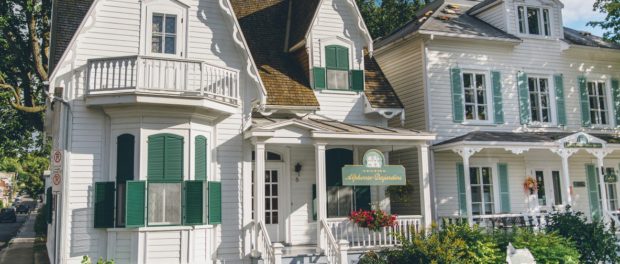1900: Desjardins & Other Quebec Curios
Part of “Shadows and Revolution”, 1900-1960
 The house of Alphonse Desjardins and his wife, Dorimène Roy. Photo credit: Claude Côté/Mouvement Desjardins/
The house of Alphonse Desjardins and his wife, Dorimène Roy. Photo credit: Claude Côté/Mouvement Desjardins/
Many people stop by their local Caisse Desjardin to do their banking, but did you know that there was a man behind the name? Alphonse Desjardins (not to be confused with another Alphonse Desjardins, a mayor of Montréal) was the man behind the idea.
Briefly a military man, Desjardins was first and foremost a journalist in his early life, writing for Le Canadien and conscious about the political and social problems that surrounded the fact of being a French-Canadian in a predominantly anglophone, British-Canadian society. Active in the conservative party and in the Chamber of Commerce for his hometown of Lévis, he was able to join the House of Commons as a stenographer. It was here that during his time as an employee of the House that he saw the legal and social ramifications of usury and the anti-French bias of the English moneylenders, brought to his attention by the tabling of a law in the House that sought to outlaw these discriminatory and very damaging acts. Behind the scenes, French-Canadians that wished to start a business or grow their agricultural enterprise were unable to get a credit loan from most of the major banks. Desjardins saw an opportunity to change this situation.
Desjardins, however, was not alone and corresponded with various economics writers in order to learn about a certain model that seemed to be growing in popularity: the cooperative model. To this end, he found contacts in other countries such as Switzerland and Belgium, both countries who had managed to succeed with this model, and throughout his life remained in contact with the contacts he had forged for advice. He teamed up with none other than his wife, Dorimène Roy, to help found the very first Caisse populaire Desjardins, gathering the support of over one hundred people. The first Caisse was run out of the Desjardins’ home, with three locations being added by the middle of the decade. Supported by the Church due to the fact that it could improve not only the material but moral standing of its parishioners, the Desjardins cooperative grew to 136 locations by 1915 and even expanded to help the French-speaking minority in Ontario with the cooperation of the Ontarian government. At the time of Desjardins’ death in 1920, there were about 140 locations across Québec and Ontario that bore his name.





